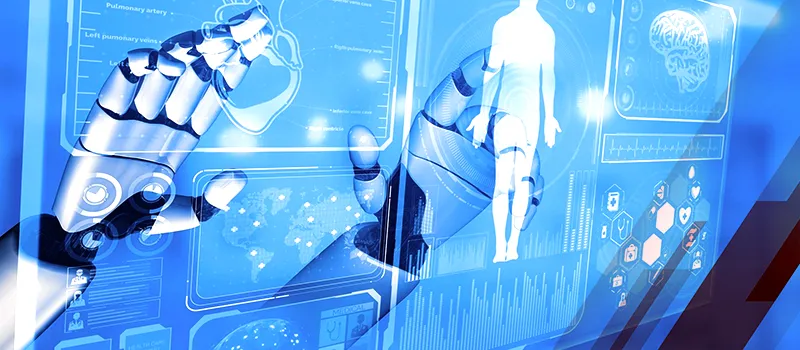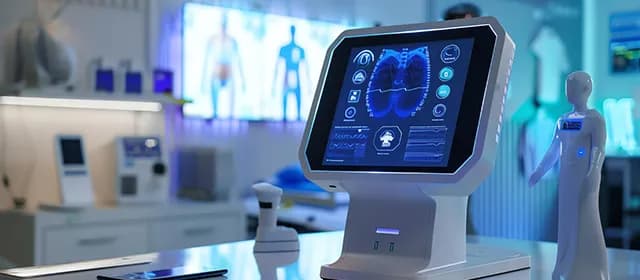In the rapidly advancing world of healthcare, time is the main factor. Healthcare professionals are often burdened with countless administrative tasks, documentation, and repetitive processes that consume valuable time and energy. But what if I told you that there was a way to soothe this burden? Enter robotic process automation in healthcare, a cutting-edge technology that meets compassion and streamlines operations.
Let’s take a look at how RPA is being integrated into healthcare, along with 3 major trends that are impacting the sector.
The Role of Robotic Process Automation in Healthcare
Robotic process automation (RPA) is a technology that employs bots or robots to automate redundant tasks by connecting and interacting with numerous systems. Especially in healthcare, it improves efficiency, reduces labor costs, and enhances quality and compliance, which results in improved patient outcomes and satisfaction.
RPA bots mimic human interactions with various digital systems used in hospitals and assist the staff in everyday operations.
The main advantage of these RPA bots is that they work 24/7 without breaks or errors.
RPA can combine with AI to create an advanced automated solution to manage intricate and various unstructured data sets, including NLP (natural language processing) and OCR (optical character recognition).
Additionally, AI integration in RPA allows the adoption of other technologies, such as computer vision, machine learning, and natural language generation, boosting automation efficiency.
The high demand for robotic process automation in healthcare underscores its substantial potential in the industry. A recent report by Kings Research states that robotic process automation in the healthcare market is estimated to register $2081.9 million in revenue by 2030, expanding at a CAGR (compound annual growth rate) of 33.6% from 2023 to 2030.
What Does Robotic Process Automation Offer in the Healthcare Sector?
In the healthcare sector, RPA offers a multitude of benefits, including:
- Better Data Management
Robotic process automation in healthcare helps organizations with electronic medical record conversion and data accuracy by extracting, moving, and syncing medical data between providers, labs, and pharmacies.
RPA ensures privacy by regulating permission and access rights while also offering fast detection and response times to counter cyber-attacks.
This initiative strengthens cybersecurity, making it attractive to healthcare providers who have faced security breaches. For example, Dorset, a city in the UK, has implemented RPA to allow quick access to medical records using Wyman robots.
- Easy Appointment Booking
Clinics and hospitals use RPA solutions to schedule appointments. RPA in Healthcare uses AI to analyze doctors' availability, convenient slots, fees, location, and other aspects when booking appointments for patients.
Consequently, new RPA solutions are emerging to ease appointment scheduling, such as Feat Systems, an Indian start-up that offers multitasking and an affordable RPA-enabled web app. This platform allows users to create appointments, alerts, and cancellations more effortlessly.
- Painless Billing and Claim Management
Robotic process automation in healthcare also aids in settling payments, including medicines, tests, food, and doctor costs, in a simplified manner. Since the robots fill in the data for payment or compliance with guidelines and monitor the complete process, it offers faster and more accurate processing, saving time and preventing further issues.
Additionally, it is designed to send personalized reminders to patients in case of a delay or billing issue. For example, the US-based firm EnterBridge offers optimal automation by speeding up various processes, such as filling out insurance data, enrolling, processing claims, tracking payments, and reducing time spent by payers and providers. Additionally, the company ensures that its offerings to consumers are priced fairly in the market.
- Enhanced Diagnosis and Patient Experience
Healthcare providers often collect vast patient data, which can be analyzed using robotic process automation. This data can provide personalized insights, improving patient care and diagnosis. Hospitals in Dublin have automated disease code input, saving three hours daily. Robotic process automation can also be integrated into telehealth services, aiding services prolonged due to the COVID-19 pandemic.
- Higher Security
The healthcare sector handles a vast amount of sensitive data daily, such as patient records, diagnostics, treatments, test results, and more, which need optimal security. The RPA solutions provide role-based access to people, which allows only authorized people to access confidential data and keep a precise audit history for further need.
3 Most Popular Trends in RPA Reshaping the Healthcare Sector
The evolving trends in robotic process automation are increasingly transforming the processes within the healthcare industry. The top 3 latest trends in this sector include:
1. Collaborative Robots (Cobots)
Collaborative robots, also known as cobots, are becoming more prevalent in healthcare settings. These RPA robots work alongside healthcare professionals, assisting them with tasks such as patient monitoring, medication delivery, and physical therapy. Cobots can enhance efficiency, enable remote care, and improve patient outcomes.
2. Telehealth Automation
With the rise of telehealth services, robotic process automation in healthcare is being used to automate various aspects of remote patient care. It regulates virtual consultations, appointment reminders, remote monitoring, and telemedicine documentation. Automation in telehealth can enhance accessibility, improve workflow, and increase patient engagement.
3. Integration with Artificial Intelligence (AI)
RPA is being increasingly combined with AI technologies to enhance automation processes in healthcare. By leveraging AI algorithms, RPA systems can analyze and interpret unstructured data, make informed decisions, and perform more complex tasks. This integration enables healthcare organizations to achieve greater accuracy, efficiency, and productivity in their workflow.
The Future of Healthcare
Robotic process automation (RPA) has emerged as a game-changing technology in the healthcare sector. From booking appointments to tracking the payment process, RPA presents a seamless harmony between the hospital systems and patients.
With its ability to automate repetitive and mundane tasks, RPA frees up human resources to focus on more strategic and value-added activities. By streamlining processes, reducing errors, and increasing efficiency, RPA has the power to transform industries across the board.
As we continue to embrace automation and technological advancements, we can unlock new levels of productivity, innovation, and growth, ultimately shaping a future where businesses thrive and individuals can focus on what truly matters.


.webp&w=3840&q=75&dpl=dpl_GTBYaT4u8UnyqQ3eaKnDQVnhNENB)

